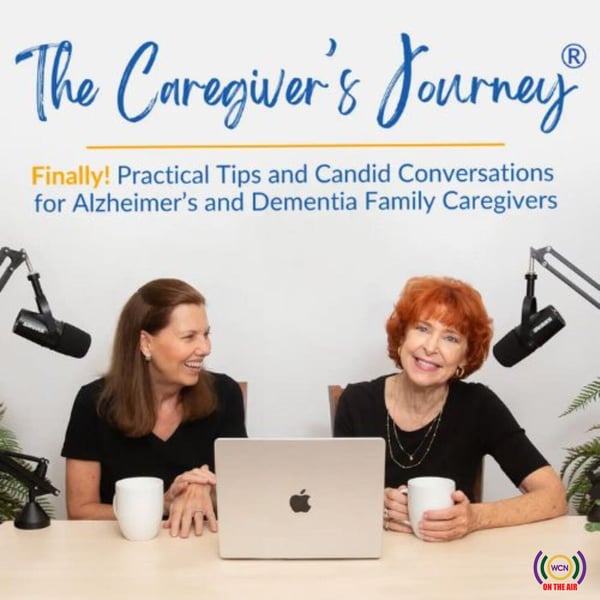Search and Rescue: Three Essential Tips / Alzheimer’s and Other Dementias
The Caregiver's Journey
Sue Ryan and Nancy Treaster
5 • 1.9K Ratings
🗓️ 4 November 2024
⏱️ 16 minutes
🧾️ Download transcript
Summary
The moment you realize your loved one with dementia is missing, every second feels critical. While the natural instinct is to immediately begin searching, having a clear action plan can make the difference in finding them quickly and safely. Through insights from John Clark, a specialized dementia search and rescue expert in Georgia, we've compiled three essential tips for these frightening situations.
Additional Resources Mentioned
Georgia Emergency Search and Rescue
John Clark USA 404-309-7386
Professionally Trained in Urban Searches
Alzheimers, Dementia, Children, Evidence Recovery, Major Disaster Search, NASAR, Disaster Assistance
Rate, Subscribe and Share Your Tips on Social Media!
Please click here to review, follow or subscribe to our podcast.
If you don’t see your preferred platform click on Podchaser and click at the bottom “Write my review”
- You can log in with Twitter, Facebook or Google
- On the right you’ll see a box with “Follow”, “Rate and Review” and “Share”
Connect with us and share your tips:
- Website: https://www.thecaregiversjourney.com
- Instagram: https://www.instagram.com/thecaregiversjourney/
- Facebook: https://www.facebook.com/TheCaregiversJourneys/
- Linkedin: https://www.linkedin.com/in/suearmstrongryan/, https://www.linkedin.com/in/nancytreaster/
- Email: [email protected], [email protected]
Takeaways
Tip 1: Make the Right First Move
Key points:
- Call emergency services immediately, before starting your own search
- Don't wait to make the call while searching on your own
- Ask if there are dementia-specialized search teams in your area
- Remember that it's okay to search after making the call
Tip 2: Provide Critical Information to Searchers
Key preparation points:
- Keep current photos readily available:
Essential information to share:
- Recent conversations and topics they've discussed
- Their maiden name or previous names
- Nicknames family members use
- Common walking routes or regular destinations
- Nearby water sources (pools, ponds, lakes)
- Places from their past they might seek out
- Their current stage in their dementia journey
- Recent behaviors or patterns
- Current medications
Tip 3: Know What to Expect After They're Found
Standard procedures:
- Medical evaluation is typical
- Transportation to hospital via ambulance or police car
- Assessment for any injuries or exposure
For More Read Full Blog here
Building Better Local Resources
Not every community has specialized dementia search and rescue teams, but there are ways to improve local capabilities:
Steps to take:
- Contact your local Alzheimer's Association chapter
- Ask about existing specialized search resources
- Inquire about training opportunities for local emergency services
- Advocate for specialized training in your community
- Network with other caregivers to share experiences and resources
Note: If you're in Georgia, specialized dementia search and rescue services are available. Contact your local emergency services or Alzheimer's Association chapter for more information.
Transcript
Click on a timestamp to play from that location
| 0:00.0 | This is the Whole Care Network, helping you tell your story one podcast at a time. |
| 0:16.3 | Content presented in the following podcast is for information purposes only. |
| 0:22.7 | Views and opinions expressed in this podcast are solely those of the host and guests |
| 0:28.1 | and may not represent the views and opinions of the Whole Care Network. |
| 0:33.2 | Always consult with your physician for any medical advice. |
| 0:36.8 | And always consult with your attorney for any medical advice and always consult with your attorney |
| 0:38.7 | for any legal advice. And thank you for listening to the Whole Care Network. |
| 0:47.9 | When you've lost your loved one with dementia, it is a frightening, frightening time. |
| 1:01.1 | Today, we're talking about what you need to know if your loved one is missing and the information |
| 1:08.8 | that you want to pass on to the people who are searching for them. |
| 1:12.3 | We have a guest today, John Clark. |
| 1:14.2 | John Clark. He is part of a specialized team that is focused here in the state of Georgia and the U.S. |
| 1:21.0 | on searching for people with dementia, and he's specially trained to do that. |
| 1:25.2 | Right. |
| 1:25.8 | We're sharing three tips. You ready to get started, John? Let's get started. Let's get to do that. Right. We're sharing three tips. |
| 1:28.7 | You ready to get started, John? |
| 1:29.3 | Let's get started. |
| 1:30.1 | Let's get started. |
| 1:30.6 | Okay. |
| 1:33.1 | Welcome. |
| 1:35.8 | We're Sue Ryan and Nancy Treister. |
| 1:40.3 | This podcast brings our years of experience in a variety of family caregiving roles to prepare you to navigate your caregiving journey. |
... |
Please login to see the full transcript.
Disclaimer: The podcast and artwork embedded on this page are from Sue Ryan and Nancy Treaster, and are the property of its owner and not affiliated with or endorsed by Tapesearch.
Generated transcripts are the property of Sue Ryan and Nancy Treaster and are distributed freely under the Fair Use doctrine. Transcripts generated by Tapesearch are not guaranteed to be accurate.
Copyright © Tapesearch 2025.

